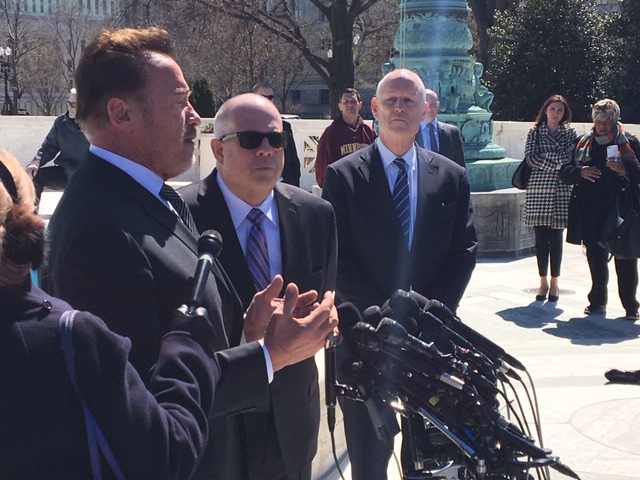Analysis: Blindsided by the Right

Gov. Lawrence J. Hogan Jr.’s crusade for redistricting reform began as a nonpartisan play with partisan overtones.
Its latest setback has been perpetrated by Hogan’s fellow Republicans. There is no small irony here.
Since taking office, Hogan has consistently advocated for a nonpartisan commission to draw congressional and legislative district lines in Maryland – a view he says he’s held since well before he ever became a successful politician.
He rolls out the standard reformer’s arguments: That Partisan gerrymandering is corrosive to our politics. That people should choose their representatives, not the other way around. That the system is in desperate need of change. That nothing less than our democracy is at stake.
But he’s been stymied at every turn by Democrats in the General Assembly.
When Hogan first started preaching redistricting reform, early in his first term, he saved all his derision for the Maryland Democrats who drew (or defended) the tortured and nakedly partisan congressional map following the 2010 Census: People like Senate President Thomas V. Mike Miller Jr., the late House Speaker Michael E. Busch, Attorney General Brian E. Frosh, and former Gov. Martin J. O’Malley – whom Hogan loathes (the feeling is mutual).
Only when prodded at the time would Hogan acknowledge the gerrymandering sins of his fellow Republicans across the land. As governor of Maryland, he would say, he was only going to focus on things he could try to change, at home.
Democrats would cite the Republican gerrymandering in a long list of other states – Florida, Michigan, North Carolina, Ohio, Pennsylvania, Texas, Virginia, Wisconsin, to name a few – for why they were resisting Hogan’s entreaties to change the map-making process at home. Why should Maryland Democrats “disarm,” they argued, when Republicans refused to do the same in those other states?
They also implied that Hogan’s only interest in trying to reform the system in Maryland was to help the GOP pick up a seat or two here.
These may have been fair political points. But they didn’t exactly put the Democrats on the moral high ground. And their proposal to create a regional compact with other states to eliminate partisan redistricting was one of the most transparent fig leaves in human history – not because it was a bad idea in theory, but because it was so obviously doomed to failure.
Yet as Hogan has evolved politically – and as his relationship with national Republicans has become more strained – his rhetoric on redistricting has also changed.
Now, he readily criticizes Republicans and Democrats in equal measure. He has appeared with former California Gov. Arnold Schwarzenegger, an even more unconventional Republican than he is, to denounce gerrymandering – and they jointly filed an amicus brief in support of the case that had been before the Supreme Court seeking to overturn the Maryland map. Hogan has also appeared with North Carolina Gov. Roy Cooper, a Democrat in a state where Republicans have hijacked the redistricting process.
Ultimately, Hogan’s push for reform was done in by conservatives on the Supreme Court. But there still could be a national solution: A sweeping political reform measure that mandates nationwide nonpartisan redistricting has passed the House of Representatives.
Of course, the legislation is bottled up in the Senate, where Majority Leader Mitch McConnell (R-Ky.) is one of the biggest obstacles to political reform in the country. Remember, McConnell, along with David Bossie, the president of the group Citizens United and the Republican National Committeeman from Maryland, are personally responsible for resisting and dismantling recent campaign finance reform laws.
And imagine if McConnell hadn’t blocked President Obama’s nomination of Merrick Garland to the Supreme Court: Would the court with a Justice Garland have voted 5-4 in favor of redistricting reform last week? A tantalizing hypothetical to ponder.
In his written opinion for the majority in the Supreme Court redistricting case, Chief Justice John Roberts wrote that federal courts simply don’t have the bandwidth to police every instance of gerrymandering. That’s a convincing enough argument as far as it goes.
But in this day and age, even the Supreme Court is a diminished and politicized institution, whose members all too often seem like partisan warriors rather than thoughtful, impartial arbiters. It’s hard not to imagine the conservative justices calculating that maintaining the status quo makes the most sense, to protect more of their own in Congress and in state legislatures.
So Hogan may well grit his teeth about the mendacity of Miller, O’Malley et al on redistricting – and he wouldn’t be wrong.
But the problem – as even Hogan now concedes – runs way deeper than Maryland. And it’s Republicans and conservatives who, most recently, declined to provide Hogan and his fellow Republicans any relief.
Last month, Hogan wrote to U.S. House Majority Leader Steny H. Hoyer, urging the powerful Maryland Democrat to embrace his efforts to reform the redistricting process at home. Earlier, Hoyer had written to Hogan, urging him to endorse the House political reform legislation, known as H.R. 1.
Will these dual endorsements ever happen?
Hogan said he was “disappointed” by the Supreme Court decision and vowed to try once more to convince the General Assembly to embrace nonpartisan redistricting. Surely he most know the outcome isn’t likely to change.
But why not try again?
If he’s somehow successful, Hogan has made Maryland’s congressional districts more competitive – and helped the GOP pick up a couple of seats in Congress. And even if he falls short, he still wins the approbation of editorial boards and good government groups.
Bruce DePuyt contributed to this report.




 Creative Commons Attribution
Creative Commons Attribution